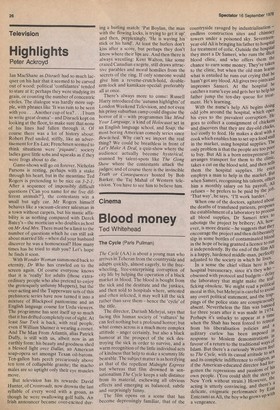Cinema
Blood money
Ted Whitehead
The Cycle (Paris Pullman) The Cycle (AA) is about a young man who arrives in Teheran from the countryside and adapts quickly, almost eagerly, to the freewheeling, free-enterprising corruption of city life by helping the operation of a black market in blood. The blood is bought from the sick and the destitute and the junkies, and then sold to hospitals where, untested and often infected, it may well kill the sick rather than save them hence the 'cycle' of the title.
The director, Dariush Mehrjui, says that facing this human society of 'vultures' he can feel nothing but a profound horror; but what comes across is a much more complex attitude anger certainly, but also a black humour at the prospect of the sick destroying the sick in order to survive, and a warm recognition of the little individual acts of kindness that help to make a scummy life bearable. The subject matter is as horrifying as that of the repellent Midnight Express but whereas that film drowned in sensationalism The Cycle keeps a safe distance from its material, eschewing all obvious effects and emerging as balanced, subtle and surprisingly funny.
The film opens on a scene that has become depressingly familiar, that of the countryside ravaged by industrialisation endless construction sites and chimneY towers under a poisoned sky. Seventeen year-old Ali is bringing his father to hospital for treatment of colic. Outside the hospital they meet a Dr Sameri, who runs the illicit blood clinic, and who offers them the chance to earn some money. They're taken to the clinic, but when the old man learns what is entailed he runs out crying that be hasn't got any blood. Ali gives two pints and impresses Sameri. At the hospital he catches a nurse's eye and gets her to help his father jump the ten-day queue for treatment. He's learning. With the nurse's help Ali begins doing odd jobs around the hospital, which open his eyes to the prevalent corruption. He goes to collect a consignment of chickens and discovers that they are day-old chicks, too costly to feed. He makes a deal with da cook which enables him to set up a food stall in the market, using hospital supplies. The only problem is that the people are too poor to buy. But Ali is a born entrepreneur: he arranges transport for them to the clinic, takes a cut on the blood sold, and then sells them the hospital supplies. He ever! employs a man to help in the market. Bo' when Sameri, recognising his talents, offers, him a monthly salary on his payroll, Alt refuses he prefers to be paid by the job. 'That way', he says, 'I'll work harder.' When one of the doctors, agitated about the deaths of transfused patients, proposes the establishment of a laboratory to process all blood supplies, Dr Sameri tries t° sabotage the project by bribery; Ali, b0 ever, is more drastic -he suggests that theY encourage the project and then deliberatel)! slip in some bottles of contaminated blood in the hope of being granted a licence to rinl. it independently. By the end of the film All is a happy, hardened middle-man, perfectlY adjusted to the society in which he lives. In a sense the chief villain here is the hospital bureaucracy, since it's they who obsessed with protocol and budgets delay the laboratory that might make the traf: ficking obsolete. We might read a politica! moral in this, but Mehrjui is careful to avoid any overt political statement, and the trappings of the police state are conspicuoilslYd absent. Nevertheless the film was bann,e, for three years after it was made in 19.1' Perhaps it's unlucky to appear at a time, when the Shah has been forced to retreat from his liberalisation policies and military curfew has been imposed response to Moslem demonstrations favour of a return to the traditional ways Islam. But there's a curiously Western fee!. to The Cycle, with its casual attitude to se; and its complete indifference to religion; 3, if the American-educated director had WI., gotten the repressions and passions of hb own people. (You could shift the story t° New York without strain.) However, the acting is utterly convincing, and there 5 at delicate, enigmatic performance by Entezami as Ali, the boy who grows up with a vengeance.


































 Previous page
Previous page